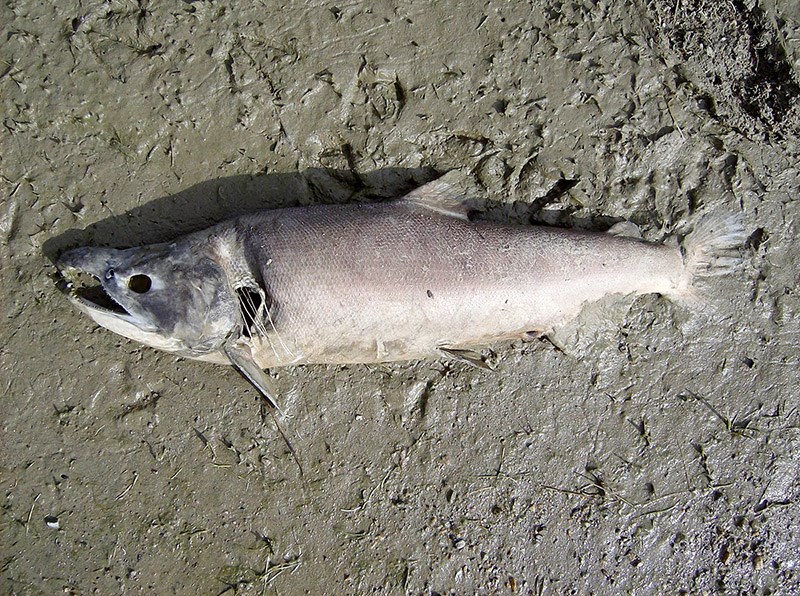The B.C. wildfires forced the Rivershed Society of BC (RSBC) to cancel its Sustainable Living Leadership Program for the first time in 14 years.
Nevertheless, we went ahead with the series of FraserFEST community events featuring Keely Weget-Whitney’s swim from Lillooet to Lytton, three Fraser Canyon rafting trips, followed by six canoe trips and four guided bicycle rides from Hope to Vancouver.
Each day of activity ended with a wild salmon feast celebration, often hosted by one of our First Nations partners. On Aug. 12, our Musqueam hosts welcomed our canoeists and cyclists to the mouth of the mighty Fraser River.
But it was eerily quiet on the river this year — not a single fishing boat to be seen. The commercial salmon fishery has yet to open this season and likely never will. There are simply not enough salmon. Even our Musqueam friends were unsure until the day before whether the menu could feature wild salmon.
Yes, it’s that bad.
Fish farms, sea lice, over-fishing, habitat destruction, climate change (warmer ocean temperatures, low stream flows) and ocean acidification are some of the concerns identified by scientists and conservation groups like RSBC that are working for the long-term survival of these keynote species.
There is also a lesser-discussed issue — genetically modified (GM) salmon — that could pose an additional threat in the future. (As reported in the Williams Lake Green Gazette, AquaBounty has created GM Atlantic salmon eggs, containing spliced genes from Chinook and the eel-like pout, capable of producing salmon that can grow twice as quickly.)
Then there’s Mount Polley. Aug. 4 marked the third anniversary of the disastrous Imperial Metals tailings pond failure. To date, our provincial government has failed to levy a single fine against the company for contaminating the Quesnel Lake ecosystem with its toxic mining wastes. Furthermore, Mount Polley has been allowed to continue operations and before Christy Clark left office, her government quietly granted Imperial Metals another mining permit.
Finally, there’s our federal government’s failure to implement the 75 Cohen Inquiry recommendations on B.C./Fraser River salmon recovery, despite spending over $37 million of taxpayers’ money to report on the crisis back in 2012.
Recently, our friends at Watershed Watch Salmon Society released their Mid-Season BC Salmon Update. A key finding is that Fisheries and Oceans Canada (DFO), in the face of accumulating evidence of poor coast-wide returns and escapements, is keeping ocean fisheries open, knowing that many populations are being overfished.
In contrast, Alaska’s Department of Fish and Game issued an emergency order on Aug. 7 closing all southeast Alaska recreational and commercial fisheries targeting chinook in order to protect chinook returning to B.C., Washington, and Oregon. The emergency order read:
“Southeast Alaska and British Columbia stocks are experiencing historically low production; many of the affected stocks will not meet escapement goals or management objectives in 2017. The data… cannot be ignored when conservation of wild stocks is the foundation of the Alaska Sustainable Salmon Fisheries Policy and the Pacific Salmon Treaty. Therefore, it is imperative that Alaska offer relief now for these stocks, with a focus on protecting future production.”
Canada’s DFO has failed to take similar direct coast-wide action to protect B.C.’s wild chinook salmon despite First Nations’ ongoing legal action. Moreover, last year, DFO monitored fewer BC salmon streams than at any other time in the department’s history since the Second World War.
Here’s what you and I can do:
• Avoid farmed salmon. Do not purchase or consume aquacultured Atlantic salmon. There are numerous documented human and environmental health effects, as clearly shared by the Wild Salmon Defenders Alliance. If your favourite sushi place has farmed salmon on the menu, engage the manager/owner and ask that the restaurant no longer feature this product.
• Encourage your mayor and council to declare your municipality a “wild salmon only zone.”
• Write to Minister of Fisheries and Oceans Dominic LeBlanc and copy your MP. Implore them to put a stop to the overfishing of B.C.’s wild salmon. Ask that DFO’s Conservation and Protection Division have the resources and political will to effectively monitor and enforce compliance with commercial fishing regulations.
• Join Amnesty International’s action calling for a public inquiry into B.C.’s mining laws in the wake of Mount Polley. Consider financially supporting the Concerned Citizens of Quesnel Lake’s GoFundMe campaign to take legal action regarding Mount Polley.
• Lend your voice by taking RSBC’s Watershed Pledge at rivershed.com/watershedpledge.
Melissa Chaun of Port Moody is an ecologist with a passion for all things sustainable. She is events co-ordinator with the Rivershed Society of BC, volunteers on various city committees and co-ordinates the monthly meetings for Tri-City Greendrinks. Her column runs monthly.



